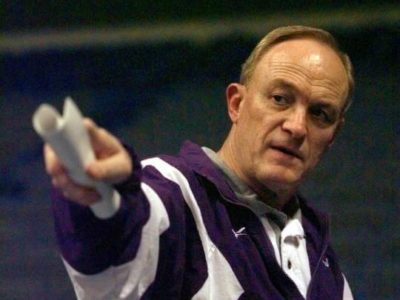Dale Brown is the former head basketball coach of the LSU Tigers, where he spent 25 years and earned two Final Four appearances. He is known primarily for his recruitment of NBA star Shaquille O’Neal and being a vocal critic of the NCAA for a multitude of reasons, including investigation practices and punishments of programs and players.
CM: As a future legendary college basketball coach, you came from humble beginnings. What obstacles did you face growing up in North Dakota?
DB: First of all, there are seven billion of us on this planet right now. Of that seven billion, all of us are going to face some sort of adversity. I really believe that adversity only visits the strong, but it stays with the weak forever. I had to deal with adversity in my life – my so-called father abandoned my mother and my siblings, never came back or sent us money. My mother had an eighth grade education, and we had to live in a one-room apartment above a hardware store. I slept in a fold-out bed from the wall, and my mother was forced to get on welfare to get by. But that is what adversity is – if you’re not strong about it, it will overcome you.
CM: After being a star athlete in college, what led you to the coaching profession?
DB: It was kind of by accident. I did not plan to coach. I was at a teacher’s college, and I had the FBI on my mind, or maybe law. But once I started coaching, I fell in love with it, and retired from it after 44 years.
.jpg) CM: As the head basketball coach of LSU for 25 years, you took the Tigers to two Final Fours in the 1980s. But one aspect you are remembered for most was your recruitment of Shaquille O’Neal. How important was the bond you made with the young Shaq before he attended college?
CM: As the head basketball coach of LSU for 25 years, you took the Tigers to two Final Fours in the 1980s. But one aspect you are remembered for most was your recruitment of Shaquille O’Neal. How important was the bond you made with the young Shaq before he attended college?
DB: It was unbreakable, and we still communicate on a regular basis 27 years later.
CM: Sadly, the ending of your LSU tenure was marred by constant battles with the NCAA. What did you see wrong with the NCAA that they needed to be called out on?
DB: The NCAA is obviously an archaic institution that legislates against human dignity and practices monumental hypocrisy. They don’t look for truth and are far from a fair organization. Writer Frank Deford said that it is the “largest legal cartel in the world.” I did not let them push me out; the system was changing, and it was time to get out. It’s a rarity for people to know when to quit. The NCAA has made improvements, but they still have light-years to go, and it has to change or it will disband.
CM: One of your former players, Lester Earl, came out and said he had been intimidated and manipulated by the NCAA into giving them dirt on you and the program. How did you find it in your heart to forgive him?
DB: It wasn’t easy. Life is a journey, and it takes some of us a little longer to discover ourselves. He was encouraged to lie. He was wrong, but the NCAA wasn’t searching for truth. I was a thorn in their side, and they were just searching for conviction. He’s a changed person now, and he’s matured a lot. Everyone has to forgive or you have that on your back forever.
CM: Your story can be told through the movie Man in the Glass: The Dale Brown Story, and you are on tour promoting your new book, Getting Over the Four Hurdles of Life. What inspired you to write this motivational book, and what are those four hurdles that challenge us?
DB: I’ve used this topic for my speeches many times before, so the publisher called me asking if I would convert the speech into a book. I’m a person that can say the words to an audience, but not necessarily write it down, so we taperecorded my voice to use for the text of the story. In the book, I give analogies to people who get over those hurdles, and I hope it will show people that they’re not immune to failure and not immune to handicaps. If we don’t overcome our hurdles, we won’t be happy.



















